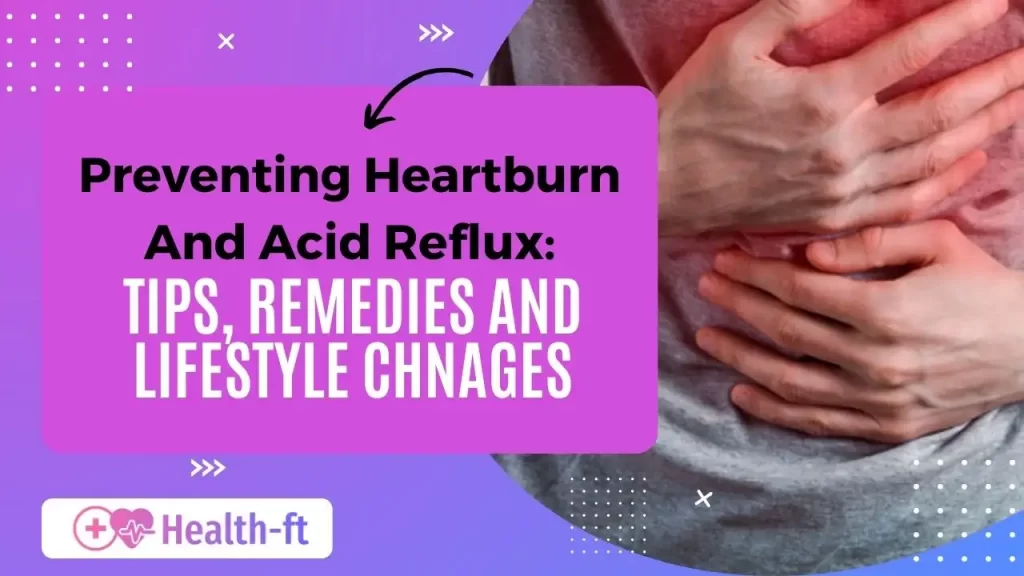Heartburn and acid reflux are more than occasional discomforts—they can significantly affect quality of life. These conditions occur when stomach acid regurgitates into the esophagus, causing irritation and pain. Fortunately, heartburn and acid reflux relief can be effectively achieved with the right strategies. This guide explores the difference between heartburn and acid reflux, their causes, symptoms, and remedies, covering dietary changes, lifestyle adjustments, and treatment options. Whether looking for immediate relief or long-term solutions, this comprehensive resource is your go-to reference.
What Is Heartburn?
Heartburn is a common condition characterized by a burning sensation in the chest, typically triggered by eating or lying down. It occurs when stomach acid escapes the stomach and irritates the esophagus. If untreated, chronic heartburn can lead to complications such as esophagitis, Barrett’s esophagus, or even esophageal cancer.What Is Acid Reflux?
Acid reflux occurs when the lower esophageal sphincter (LES)—the muscle acting as a valve between the stomach and esophagus—fails to close correctly. This allows stomach acid to flow back into the esophagus, causing discomfort. Chronic acid reflux can develop into gastroesophageal reflux disease (GERD), a condition requiring medical intervention. Gastroesophageal reflux disease (GERD) is a prevalent condition, with an estimated 442 million cases worldwide. The hallmark acid reflux symptoms include heartburn and regurgitation, frequently managed through acid-suppressing medications such as proton pump inhibitors (PPIs) and histamine-2 receptor antagonists (H2RAs). However, GERD is not just a benign digestive condition—it has broader implications for overall health. It’s important to note that GERD is a chronic condition. If heartburn occurs more than twice a week, it may indicate GERD, requiring medical consultation and treatment.Symptoms of Heartburn and Acid Reflux
Common heartburn and acid reflux symptoms include a burning sensation in the chest, often worsening after meals or when lying down. Regurgitation, a sour or bitter taste in the mouth, may occur when stomach acid flows back into the throat. Difficulty swallowing, or dysphagia, is another potential symptom, signaling irritation or complications in severe cases. Additional symptoms can include chronic coughing, especially after eating, and hoarseness or a sore throat caused by irritation of the vocal cords. Recognizing these symptoms is crucial for effective management and prevention.Dietary Changes for Heartburn and Acid Reflux
What you eat is vital in managing heartburn and acid reflux. While focusing on reflux-friendly foods, maintaining a liver health diet can support overall digestive health and reduce the burden on your system, helping to alleviate symptoms. On the other hand, certain foods can help to cure heartburn and acid reflux. Identifying and avoiding trigger foods can dramatically reduce symptoms. Spicy foods, citrus fruits, chocolate, caffeine, fatty meals, and alcohol are common culprits. These foods irritate the esophagus, relax the LES, or increase acid production. Below, I share a detailed list of foods to eat and avoid.| Category | Food/Item | Details |
|---|---|---|
| Foods to Avoid | Spicy Foods | Includes chili, hot sauce, and similar ingredients. It can irritate the esophagus and worsen reflux symptoms. Consume in smaller portions or avoid it altogether. |
| Foods to Avoid | Citrus Fruits | Oranges, lemons, limes, and grapefruits are highly acidic and increase stomach acid, triggering reflux. Limit or avoid. |
| Foods to Avoid | Chocolate and Caffeine | Relax the LES, allowing stomach acid back into the esophagus. Includes coffee, tea, cola, and energy drinks. Replace with decaffeinated or herbal options. |
| Foods to Avoid | Fatty Foods | High-fat foods like fried items, fatty meats, and decadent desserts remain in the stomach longer, increasing pressure on the LES. Opt for low-fat alternatives. |
| Foods to Avoid | Alcohol | Alcohol relaxes the LES and stimulates acid production. Reducing or eliminating intake can help. |
| Foods That Can Help | Ginger | A natural anti-inflammatory that soothes the digestive tract. Use in teas, meals, or raw form. |
| Foods That Can Help | Bananas | Bananas are low in acid and rich in potassium and help neutralize stomach acid and improve digestion. |
| Foods That Can Help | Oatmeal | A fiber-rich option that absorbs stomach acid and provides long-lasting relief, especially when eaten in the morning. |
| Foods That Can Help | Green Vegetables | Low-fat and low-acid vegetables like spinach, broccoli, and kale are excellent for managing reflux. Incorporate in various meals. |
| Foods That Can Help | Melons | Low-acid fruits like cantaloupe, honeydew, and watermelon are refreshing and help reduce reflux symptoms. |
Lifestyle Adjustments for Long-Term Prevention
Simple lifestyle changes can make a significant difference in managing heartburn and acid reflux.Avoid Tight-Fitting Clothing
Tight clothes can increase abdominal pressure, leading to acid reflux. Opt for loose-fitting garments to minimize discomfort.Maintain a Healthy Weight
Excess weight places pressure on the stomach, increasing the likelihood of acid reflux. Managing your weight can help reduce symptoms.Sleep Position
Knowing how to sleep with heartburn and acid reflux is essential. Elevate your head using a wedge pillow or raise the head of your bed. Sleeping on your left side positions the stomach below the esophagus, reducing reflux.Limit Carbonated Beverages
Carbonated drinks cause bloating, increasing stomach pressure and making acid reflux more likely. Opt for non-carbonated alternatives instead.Avoid Mint
Mint and mint-flavored products can relax the LES, exacerbating heartburn. Avoid consuming mint if you are prone to acid reflux. If you smoke, quitting is highly beneficial. Nicotine weakens the LES, making acid reflux more likely. Reducing stress through practices such as yoga, meditation, or deep breathing can also alleviate symptoms by minimizing acid production linked to anxiety.Remedies for Immediate Heartburn and Acid Reflux Relief
Over-the-counter heartburn and acid reflux medicines like antacids provide quick relief by neutralizing stomach acid. H2 blockers, such as Pepcid or Zantac, reduce acid production and are especially effective when taken before meals. Natural remedies, such as drinking chamomile or licorice root tea, can soothe the digestive system. Baking soda mixed with water neutralizes stomach acid temporarily, while apple cider vinegar in small amounts may balance stomach pH.Nighttime Strategies for Better Sleep
Heartburn worsens at night due to lying flat, allowing acid to flow into the esophagus. Avoid eating at least three hours before bedtime to give your stomach enough time to empty its contents. Elevate your head while sleeping to use gravity to your advantage, and consider sleeping on your left side to minimize reflux. Additionally, exploring relaxation techniques for sleep can help improve overall sleep quality, reduce stress, and reduce its effects on acid reflux.Potential Complications of Untreated GERD
If left untreated, GERD can lead to severe complications, including esophagitis, esophageal strictures (narrowing of the esophagus), or Barrett’s esophagus, a condition that increases the risk of esophageal cancer. Recognizing and treating GERD early is crucial for preventing these serious outcomes.Potassium and Digestive Health
Potassium, an essential mineral, supports muscle function and pH balance, which can influence acid reflux. Potassium-rich foods like bananas, sweet potatoes, spinach, avocados, and coconut water promote digestive health. These foods are also alkaline, helping to neutralize stomach acid.Encourage Consultation with Healthcare Providers
If symptoms persist or worsen despite these lifestyle and dietary changes, consult a healthcare provider for personalized guidance and treatment. Chronic or severe symptoms may require medication, therapy, or other interventions to prevent complications.Conclusion
Heartburn and acid reflux can disrupt daily life and sleep, but they are manageable with the right approaches. Dietary changes, lifestyle adjustments, and natural or medical remedies are all effective forms of heartburn and acid reflux treatment that can help alleviate symptoms and prevent recurrence. If symptoms persist or worsen, consult a healthcare provider for personalized guidance. Remember, improving gut health is a lifelong process. Stay informed, proactive, and committed to your well-being to keep heartburn and acid reflux at bay.FAQS
What is the fastest way to treat or relieve heartburn symptoms?
To quickly get rid of this problem, one can use some of the antacids that; Tums or Rolaids, that helps to neutralize the stomach acid.
Can stress cause acid reflux?
Yes, stress in fact, stimulates the production of stomach acid and weakens the muscles at the lower end of esophagus causing acid reflux.
Is acid reflux and heartburn the same thing?
No, acid reflux and heartburn are not the same. The difference between heartburn and acid reflux is that acid reflux is the backflow of stomach contents, while heartburn is the burning sensation it causes.




